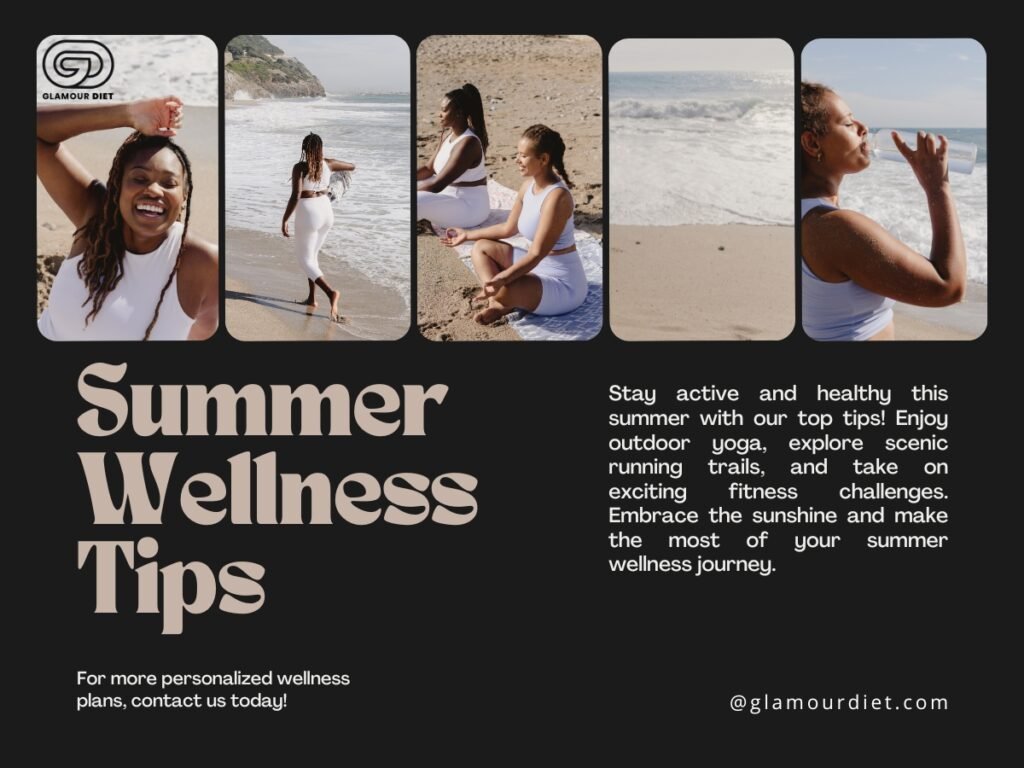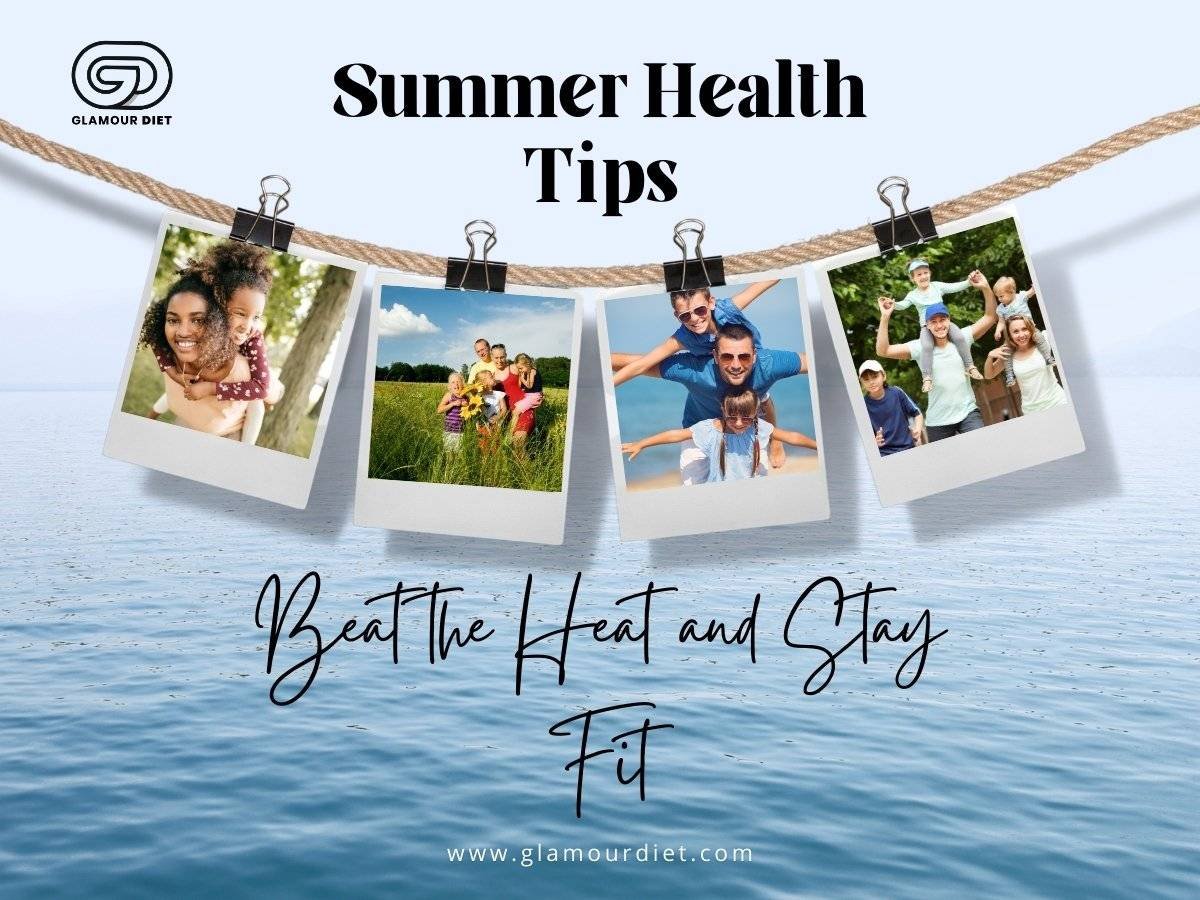Let’s Discuss Summer Health Tips.
Summer is a moment of enjoyment, relaxation, and outdoor movement. However, the sweltering heat can also pose several health challenges. Whether it’s dehydration, heatstroke, or sunburn, the risks of summer can quickly overshadow the joys if we aren’t careful. Staying healthy during the hot months isn’t just about avoiding these dangers but also embracing habits that keep you fit and active. In this article, we’ll explore six essential summer health tips to help you beat the heat while staying in peak condition.

Tip 1: Stay Hydrated
Why Hydration is Key
When temperatures soar, your body loses water more quickly through sweat. Staying hydrated is crucial because water helps regulate your body temperature, keeps joints lubricated, and aids in nutrient transport and digestion. Dehydration can lead to tiredness, dizziness, and more harsh situations like heat exhaustion.
Best Drinks for Staying Hydrated
While water is the best choice, you can also hydrate with fruit-infused water, coconut water, or herbal teas. Avoid sugary beverages and powerful caffeine, as these can exhaust you also. Drinking water always throughout the day is essential to keeping optimal hydration levels.
Tip 2: Eat Light and Nutritious Meals
Importance of a Balanced Diet in Summer
During summer, your body’s metabolism slows down, and heavy meals can cause discomfort. Opt for light, nutritious meals that are easy to digest, such as salads, fruits, and lean proteins. A diet rich in vitamins and minerals will keep your energy levels high and help you combat the heat more effectively.
Foods to Include and Avoid
Include plenty of fresh fruits and vegetables like watermelon, cucumber, and leafy greens. Avoid heavy, oily, or fried foods that can increase body heat and cause digestive issues. Incorporating foods with high water content can also aid in hydration and help keep you cool.
Tip 3: Exercise Smartly in Hot Weather
Safe Outdoor Exercise Tips
Exercising in the heat can be challenging, but it’s not impossible. The key is to avoid peak sun hours between 10 a.m. and 4 p.m. and to prefer shady locations or a more relaxed duration of the day for your training. Wearing breathable, moisture-wicking fabrics can also help regulate body temperature.
Alternatives to Outdoor Workouts
If outdoor activities seem too risky, consider indoor alternatives. Gyms, home workouts, or swimming can provide excellent exercise options without the added risk of heat exposure. Indoor spaces like community centers often offer fitness classes that can be a fun way to stay active.
Tip 4: Save Your Skin from the Sun
Understanding UV Radiation
The sun’s ultraviolet (UV) rays can cause significant skin damage, leading to sunburn, premature aging, and even skin cancer. It’s essential to understand the UV index in your area and take appropriate precautions to protect your skin.
Effective Sunscreen Use and Skin Care
Applying sunscreen with at least SPF 30 is one of the best defenses against UV damage. Identify to reapply every two hours, particularly if you’re swimming or sweating. Wearing hats, sunglasses, and protective clothing can further shield your skin from harmful rays.
Tip 5: Wear Appropriate Clothing
Choosing the Right Fabrics
The type of clothing you wear can make a big difference in how you feel in the heat. Opt for light-colored, loose-fitting clothes made of natural fibers like cotton or linen, which allow your skin to breathe and stay cool.
Tips for Selecting Summer Outfits
Layering can be a practical approach to summer dressing. Light layers protect against sun exposure while still allowing air circulation. Avoid dark colors and synthetic fabrics, which can trap heat and increase sweating.
Tip 6: Get Enough Sleep and Rest
The Role of Sleep in Maintaining Health
Sleep is vital for overall health and well-being, especially during summer when our bodies are constantly adjusting to the heat. A good night’s sleep helps in muscle recovery, boosts immune function, and keeps your mind sharp and focused.
Tips for Improving Sleep Quality in Hot Weather
To improve sleep quality, keep your bedroom cool and dark. Utilizing fans, supporting windows open for ventilation, or even setting a damp cloth on your forehead can assist control body temperature. Consider using lightweight, breathable bedding to avoid night sweats.
Importance of Mental Health in Summer
Managing Stress and Anxiety
Summer activities can sometimes lead to exhaustion and stress, especially with added heat and social obligations. Practicing mindfulness, meditation, or yoga can help manage stress and maintain mental clarity.
Activities for Mental Well-being
Engage in activities that you enjoy, such as reading, painting, or gardening. These activities not only provide relaxation but also improve your mood and reduce anxiety.
Recognizing Signs of Heat-Related Illnesses
Common Symptoms of Heat Exhaustion and Heatstroke
Heat-related infections can vary from soft warmth cramps to powerful heatstroke. Symptoms include excessive sweating, nausea, dizziness, and a rapid pulse. It’s essential to identify these symptoms before to control more serious difficulties.
What to Do if You or Someone Else is Affected
If you suspect heat exhaustion, move to a cooler place, hydrate, and rest. For heatstroke, seek immediate medical attention as it can be life-threatening.
The Role of Electrolytes in Summer Health
Why Electrolytes Are Essential
Electrolytes like sodium, potassium, and magnesium play a critical role in maintaining fluid balance and muscle function. During hot weather, your body loses electrolytes through sweat, which can lead to cramps and fatigue if not replenished.
How to Replenish Electrolytes Naturally
Incorporate foods rich in electrolytes like bananas, nuts, and yogurt into your diet. Sports drinks can also be beneficial, but opt for low-sugar options to avoid unnecessary calories.
Tips for Staying Cool Indoors
Efficient Ways to Cool Your Home
Keeping your home cool can be challenging, but there are several strategies to make it easier. Using fans, closing curtains during peak sun hours, and opening windows in the evening can help maintain a cooler environment.
Benefits of Air Conditioning and Alternatives
While air conditioning is effective, it’s not always feasible for everyone. Portable air coolers, fans, and even cold showers can be great alternatives to keep you comfortable indoors.
The Benefits of Summer Fruits and Vegetables
Nutritional Advantages of Seasonal Produce
Summer fruits and vegetables like berries, melons, and tomatoes are not only delicious but also packed with nutrients. These seasonal treats are high in water content, helping with hydration and providing essential vitamins and minerals.
Creative Ways to Include Them in Your Diet
Incorporate these fruits and vegetables into salads, smoothies, or snacks. This adds variety to your diet and ensures you’re getting the full range of nutrients your body needs to stay healthy.
How to Plan Safe Summer Activities
Fun, Low-Risk Outdoor Activities
Summer is perfect for outdoor fun, but safety should always come first. Activities like early morning hikes, beach visits, or picnics in shaded areas can be both enjoyable and safe.
Ensuring Safety During Travel and Outdoor Adventures
Always carry water, wear appropriate clothing, and apply sunscreen. Planning and knowing your limits can prevent accidents and heat-related issues.
Hydration Myths to Avoid
Common Misconceptions About Staying Hydrated
There are many myths about hydration, such as the idea that you only need to drink when you’re thirsty. In reality, thirst is not always a reliable indicator of hydration needs, especially in hot weather.
Facts to Keep You Properly Informed
Stay ahead of thirst by drinking water regularly, even if you don’t feel thirsty. Listen to your body and adjust your fluid intake based on your activity level and environment.
Conclusion
Staying healthy and fit during the summer requires a proactive approach. By following these tips—staying hydrated, eating well, exercising smartly, protecting your skin, wearing the right clothing, and getting enough rest—you can beat the heat and enjoy all the wonderful things summer has to offer.
Remember to listen to your body and prioritize your well-being, so you can make the most of this vibrant season.
FAQs
1. What are the best ways to stay hydrated in summer?
The best ways to stay hydrated include drinking plenty of water, consuming water-rich foods like fruits and vegetables, and avoiding excessive alcohol and caffeine.
2. How can I save my skin from sunlight harm?
Protect your skin by using sunscreen with at least SPF 30, wearing protective clothing, and avoiding extreme sun hours. Reuse sunscreen for two hours when you’re staying outdoors.
3. What are some good exercises to do in hot weather?
Consider early morning or late evening outdoor activities, indoor exercises, swimming, or fitness classes in air-conditioned environments.
4. How can I improve my sleep during the summer?
To improve sleep quality, keep your sleeping area cool, use lightweight bedding, and maintain a consistent sleep schedule.
5. What are the symptoms of heat-related illnesses, and how can I control them?
Symptoms include dizziness, excessive sweating, and nausea. Prevent these by staying hydrated, taking breaks, and avoiding strenuous activities during peak heat hours.

